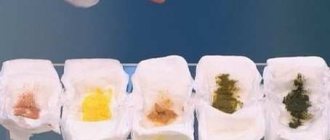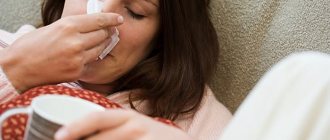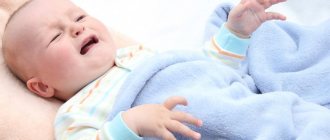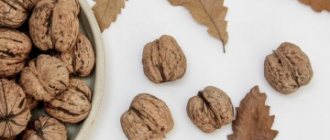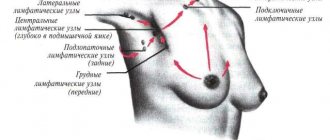What is diarrhea?
The medical term “diarrhea” is a condition where bowel movements occur too often. With normal nutrition and sufficient water consumption, bowel movements occur 1-2 times a day. If the number of trips to the toilet increases, diarrhea may be suspected.
The second determining factor is the consistency of the stool. Normal human excrement is quite hard and cylindrical in shape, but with diarrhea it changes to a mushy, semi-liquid, watery mass. Mothers mistake diarrhea during breastfeeding for an illness, but this is only a sign of it.
Why is diarrhea dangerous during breastfeeding?
Diarrhea during breastfeeding can lead to dehydration in a woman. Lack of fluid negatively affects lactation, reducing the amount of breast milk.
If we are talking about treatment with antibiotics, then breastfeeding will have to be temporarily stopped. If mommy does not take measures to preserve milk, then she may have to forget about breastfeeding, since lactation will stop.
If hygiene rules are not followed, the mother can infect the child with an intestinal infection. We must remember that such diseases in infants are more severe than in adults, so you need to behave extremely carefully and be sure to wash your hands with soap.
Symptoms of diarrhea in a nursing mother
The illness occurs in different ways, but the general symptoms are the same:
- weak, lethargic state;
- abdominal cramps;
- dyspepsia;
- temperature increase;
- nausea.
Diarrhea and vomiting in a mother while breastfeeding are a serious reason to start treatment. Dehydration due to diarrhea occurs very quickly, which provokes serious complications - microelements are also excreted in the stool.
Important! If there are mucous impurities or blood in liquid stool, then urgent hospitalization is necessary. If the excrement turns black, an ambulance is called, since the symptoms indicate bleeding in the intestines.
Causes of intestinal upset in women during lactation
Diarrhea during breastfeeding can occur for various reasons. The main ones are:
- irritable bowel syndrome;
- poisoning with low-quality food products;
- allergy;
- intestinal infections.
Irritable bowel syndrome (IBS) is a common companion for nursing mothers. It develops against the background of stress and emotional tension, which are observed in abundance in the life of every woman who has recently become a mother. In addition to diarrhea, this pathology is characterized by pain of varying degrees of intensity, localized in the lower abdomen, and increased gas formation. The main sign by which doctors distinguish IBS from other diseases is the patient’s absence of nausea, vomiting, blood in the stool, or increase in body temperature. Diarrhea with this pathology does not lead to a deterioration in overall health. It is observed during the waking period, when the woman’s muscles are in a tense state, and never causes her to wake up in the middle of the night. For diarrhea caused by IBS, there is no need to take medications to help consolidate stool. The disease is treated with muscle relaxants and sedatives approved for use during breastfeeding.
The cause of diarrhea in a mother during breastfeeding is often food poisoning. When stale foods enter the body, they begin to release toxins that lead to malfunction of the digestive tract, causing intestinal upset, nausea, vomiting, abdominal pain, increased body temperature, and general weakness. Food poisoning during lactation poses a danger not only to the nursing mother, but also to her child. At the first signs of illness, a woman needs to call a doctor who will select a treatment for her that does not require interruption of breastfeeding.
Intestinal upset during breastfeeding can develop against the background of an allergic reaction to certain foods. Most often, this symptom is observed in women who suffer from hypersensitivity to milk, but it can also occur in the presence of individual intolerance to other products. With diarrhea caused by an allergic reaction, watery stools are observed up to 6 times a day. In addition, a woman may be bothered by complaints of decreased appetite, flatulence, dizziness and general weakness. To get rid of the problem, nursing mothers should adjust their diet, completely eliminating allergenic foods from it.
Diarrhea during breastfeeding may be a sign of an intestinal infection. This disease is often diagnosed in mothers who do not maintain personal hygiene or eat unwashed foods. On the surface of dirty hands, fruits and vegetables there are many pathogenic bacteria, which, when they enter the intestines, begin to multiply rapidly, leading to dysbacteriosis and intoxication of the body. A doctor may suspect a food infection if a nursing mother, in addition to diarrhea, experiences abdominal pain, vomiting, loss of appetite, high fever, and lethargy. With this pathology, stool is profuse (up to 10-15 times a day) and watery. Sometimes bloody impurities can be seen in the stool. Treatment of intestinal infections should always be carried out under the supervision of a specialist. To avoid infecting the baby, a nursing mother should try to wash her hands as often as possible.
Causes of diarrhea
One of the harmless factors that provoke diarrhea during breastfeeding is the woman’s excessive anxiety. Inexperience gives rise to a lot of fears, and diarrhea begins against the background of stress. To restore emotional balance, you will need to consult a doctor who will prescribe medicinal teas or sedatives.
Taking a number of medications can lead to temporary stomach upset, so it is better not to self-medicate. Even when prescribing antibiotic therapy, the therapist will supplement the regimen with maintenance drugs that contain lactobacilli and bifidobacteria.
Diarrhea often occurs due to irritable bowel syndrome (IBS), with different clinical presentations:
- The intestinal mucosa is not affected by pathogens, so the temperature remains normal.
- Indigestion alternates with constipation. There is a false urge to go to the toilet or a feeling of incomplete bowel movement.
- When a nursing mother has diarrhea, her stomach hurts in the lower part, like before her period.
- Bloating and flatulence disappear after bowel movement.
Doctors cite hormonal fluctuations that occur in women after childbirth as one of the reasons for the development of IBS.
Intestinal infections
Throughout the entire period of lactation, the body of a nursing mother is weakened, therefore it is easier and faster to be attacked by microbes. Pathogenic bacteria produce toxic substances - in this condition, therapy with detoxifying drugs will be required. The acute question arises whether a mother can feed her baby breast milk if she has diarrhea, due to the risk of possible infection. To protect the baby, it is necessary to wash your hands frequently with soap, since skin-to-skin contact is the only route of transmission.

Allergy
An allergic reaction is manifested by an upset stomach and skin rashes, but this cause is extremely rare during lactation. A strict diet for a mother who is breastfeeding her baby eliminates diarrhea due to food irritants. A woman can afford to make mistakes in her diet after introducing complementary foods, but she is unlikely to indulge in an obvious allergen.
Poisoning
Symptoms are characterized by fever, as well as vomiting and diarrhea in a nursing mother. The likelihood of dehydration increases, so treatment under medical supervision is necessary. Food poisoning only affects a woman's intestines, without affecting the organs that are responsible for producing breast milk.
Foods that can cause diarrhea while breastfeeding
With a strict diet or food restrictions, a nursing woman sometimes wants to treat herself to something tasty. The intestines can react violently to such experiments, so everything new and “well forgotten old” should be introduced into the diet in small portions. However, there are a number of foods that cause diarrhea during lactation:
- Fried and fatty foods. It is difficult for the stomach to cope with foods that are too heavy, so excess fat will most likely lead to diarrhea. It’s not for nothing that doctors recommend completely eliminating such foods from the diet - diarrhea will appear in mother and baby during breastfeeding, since the child’s fragile intestines will also react violently.
- Mushrooms. Hard fibers are poorly digested, and the additional load on the gastrointestinal tract can lead to indigestion not only for nursing women. A child may experience such cramps and cramps in the tummy that a couple of sleepless nights are guaranteed.
- Alcohol. Any sane woman will completely eliminate alcohol during lactation, but not everyone is able to resist the persuasion of relatives at a family celebration. “You can’t get drunk from one sip” - it’s hard to argue with this statement, but a tiny amount of alcohol is enough to cause diarrhea. The leader in the list of record holders is red wine, which is considered the safest and even healthiest drink.
- Coffee. In addition to the diuretic effect, aromatic grains have the ability to liquefy stools, especially on an empty stomach.
- Vegetables. In order not to have to look for information on how to treat diarrhea during breastfeeding in a mother, it is advisable to give up legumes, zucchini and pumpkin. Or at least reduce their consumption to a minimum, given the laxative effect on the intestines.
- Dairy products. Small portions of kefir or yogurt are normally digested in the gastrointestinal tract, but an excess of live fermented milk cultures will lead to a “mutiny on the ship.” As breastfeeding experts advise, you need to know moderation in everything.
- Whole grains and dried fruits. The fibers of the listed plant crops are practically not broken down and are excreted undigested, causing stool liquefaction.

Causes of diarrhea (diarrhea)

There are four main causes of diarrhea in a nursing mother:
- Poisoning with poor quality food products.
- Allergy.
- Intestinal infection.
- Irritable bowel syndrome (IBS).
IBS . This syndrome is often observed in women who have experienced serious emotional shock or stress. Distinctive signs of IBS:
- there are no blood impurities in the stool;
- body temperature is within normal limits;
- loose stools appear only during the daytime;
- no nausea or vomiting.
Muscle relaxants or sedatives can help cope with this problem. They can be taken during breastfeeding (BF), but only after consulting a doctor.
Poisoning . In case of food poisoning, a nursing mother will have to reconsider her diet, since this disorder is dangerous for the baby. By contacting a doctor, a woman will receive recommendations on a special diet and will be able to select medications appropriate for lactation.
Allergy . If diarrhea appears as a result of an allergic reaction, then it is enough for the mother to exclude the dangerous product from the diet and continue breastfeeding.
Intestinal infections most often develop as a result of ignoring hygiene rules. Pathogenic microflora enters the digestive tract, multiplies and releases toxic substances. Due to the activity of these microorganisms, diarrhea appears during hepatitis B. Therefore, you must remember to wash your hands and food before eating.
Chronic diarrhea
Rare cases of diarrhea during lactation include its chronic form. In this case, consulting a doctor is mandatory, since prolonged dehydration can be fatal. With chronic diarrhea, a woman may experience:
- dizziness;
- cardiopalmus;
- lethargy and fatigue;
- the appearance of cold sweat.
With chronic diarrhea, a woman may experience black stools (mixed with blood). The appearance of this symptom may indicate bleeding in the intestines, which requires emergency medical attention.
The danger of diarrhea for mother and baby
For a nursing mother, you need to find a remedy for diarrhea as soon as possible, since the harm is only done to her body:
- important microelements are washed out;
- the risk of dehydration increases.
It is impossible to infect a child if basic hygiene rules are observed. Intestinal infections are transmitted by the fecal-oral route - the baby will get sick if he accidentally swallows particles of contaminated excrement. Bacteria are not transmitted with milk, but the baby can receive useful antibodies that will strengthen its immunity.
Only some methods of therapy (for example, taking antibiotics) pose a danger, so treatment should be prescribed by a doctor after determining the cause of diarrhea.
How to treat diarrhea in a nursing mother with folk remedies
What to do if the necessary medications are not at hand and it is not possible to get them in the near future? In this case, proven folk remedies can help with diarrhea. They are not only effective, but also do not pose a danger to breastfeeding. After breast milk, the baby will receive only useful antibodies produced by the mother, and not a “bouquet” of chemicals that are harmful to the child’s body.
Recognized remedies for diarrhea are:
- Decoction of oak bark (200 ml of boiling water per 1 tablespoon).
- Decoction of bird cherry berries (250 ml of boiling water per 2 tablespoons of dried berries).
- Peppermint infusion.
- Thick jelly made with starch.
- Pomegranate and decoction of pomegranate peels.
- Rice water.
We must remember that you should not overuse these drugs, just like any other medicine for diarrhea. There is always a risk of constipation.
Diarrhea in a nursing woman is an extremely unpleasant condition, but there is no need to worry and immediately stop breastfeeding. A qualified doctor should help you understand the symptoms and prescribe adequate treatment. Only under this condition will the disease pass quickly and without a trace.
Very often, after giving birth, a woman forgets about her own health, completely focusing her attention on the baby. But when breastfeeding, indigestion can often occur, which leads to a deterioration in the well-being of both the mother and the child. Diarrhea during breastfeeding is a problem that must be eliminated. If it occurs, you should immediately consult a doctor who will determine the exact cause of the ailment. The functioning of the digestive system is influenced by many different factors. Diarrhea in a nursing mother can occur at any time.
Is it possible to breastfeed while having diarrhea?
Is it possible to feed a baby if a nursing mother has diarrhea? This is one of the pressing issues that causes controversy with the older generation. Grandmothers are sure that any disease is transmitted to the baby, so they insist on stopping lactation. This is the most harmful advice that exists, since early weaning is fraught with negative consequences. If you wash your hands thoroughly after each visit to the toilet, your child will be completely safe.
To avoid doubts about whether it is possible to breastfeed if the mother has diarrhea, it is advisable to consult with a breastfeeding specialist in advance. Defending your own point of view during acute diarrhea is not the best option, so all controversial issues need to be discussed with relatives in advance.
Important! During an intestinal infection, the female body produces immune cells that pass through the milk to the baby, so it is even beneficial to continue feeding. It is sometimes necessary to interrupt lactation if therapy is incompatible with breastfeeding, but modern pharmacology offers many safe drugs.
Possible causes of diarrhea during breastfeeding
Diarrhea in a mother of a baby can be due to the following reasons:
Food poisoning
Poisoning from low-quality stale food is the most common cause of diarrhea in a nursing woman. Despite all the recommendations for proper nutrition and strict selection of foods, a nursing mother may eat something wrong. Symptoms of the condition are as follows:
- Vomiting and diarrhea.
- Nausea.
- Burping like a rotten egg.
- General weakness.
- Increased body temperature.
Irritable bowel syndrome
A fairly common condition in women during breastfeeding. The condition is unpleasant, but not dangerous and does not require discontinuation of breastfeeding. Symptoms:
- Diarrhea without vomiting and fever.
- At night, diarrhea does not bother you, as the muscles are in a relaxed state.
Allergic reactions
Diarrhea is often a symptom of a food allergy. In addition to this condition, the patient should note some other changes in the body - rash, itching, redness on the skin.
Foods that cause diarrhea if consumed in excess
The cause of diarrhea is not always a disease.
Sometimes a mother may overuse products that have a laxative effect.
This is the mildest case and requires little symptomatic treatment.
Often no medication is required at all.
List of laxative products that should not be abused:
- Plum and prunes.
- Beet.
- Fresh kefir.
- Kiwi.
- Fiber-rich foods (bran, fresh vegetables and fruits).
Infection
Infection is also a fairly common cause of diarrhea in a nursing mother. The entry of pathogenic bacteria into the body most often occurs due to violations of hygiene rules. Unwashed hands, unprocessed fruits and vegetables, meat and milk from private producers without certification - all this can cause an acute intestinal infection. The condition is quite dangerous, requiring complex treatment and hospitalization.
Rotavirus or "stomach flu"
The disease is quite common in the modern world. Viruses are very tenacious; they easily tolerate chlorinated water and low temperatures. Infection is most likely during the cold season. For prevention, you need to follow the rules of personal hygiene and spend less time in crowded places, especially in clinics and playgrounds, since children are most often susceptible to rotavirus disease. Symptoms may include:
- Temperature above 38 degrees (often may be absent).
- Diarrhea with a strong unpleasant odor and mucus.
- Vomiting and nausea.
- Weakness, fatigue, drowsiness.
First aid for a nursing mother with diarrhea
You can cope with the primary signs of illness on your own at home if you take an effective absorbent:
- Smecta;
- Polysorb;
- Carbolene;
- Atoxyl;
- Lactofiltrum;
- Sorbex.

There is no clear answer to the question whether a nursing mother can use activated charcoal for diarrhea. It certainly won’t harm a woman or child, but it won’t bring much benefit. There are many modern and more effective means to eliminate diarrhea.
Additionally, you need to drink more than 2 liters of fluid to prevent dehydration. It is better to drink in small portions and small sips so as not to provoke vomiting. It is advisable to temporarily follow a gentle diet, eliminating food irritants. When the acute attack passes, you need to consult a doctor - he will identify the cause of the ailment and prescribe a course of adequate therapy.
Is it necessary to stop feeding?
Experts say that diarrhea during breastfeeding is dangerous for the mother, and not for the child. Diarrhea affects only the intestines and does not affect the quality of breast milk.
The way to get an intestinal infection is through dirty hands and poorly processed foods.
Bacteria that provoke the development of the disease are not transmitted through human milk . However, at the same time, the mother should wash her hands thoroughly so that pathogenic microorganisms do not enter the baby’s body through the fecal-oral route.
Some doctors, on the contrary, advise to continue feeding, since the produced immune cells are transferred to the baby with milk, which will protect the baby in the future.
The doctor will recommend stopping breastfeeding when he prescribes medications for diarrhea, which are contraindicated during lactation. However, it is important to note the fact that most medications and folk remedies are absolutely safe - they do not pass into breast milk and do not adversely affect the baby.
Most often, stopping breastfeeding is necessary when taking antibiotics.
If the infection is viral or the woman's condition constantly worsens, then a temporary cessation of breastfeeding is possible.
Sometimes when using drugs, it is necessary to select a special treatment regimen.
Therefore, whether it is possible to feed your baby with diarrhea, you should ask your doctor.
Treatment
The body can cope with many pathogens in a few days, but sometimes complex treatment may be necessary. Preparations with bifidobacteria will help normalize the intestinal microflora. The therapist will tell you which ones are needed in each specific case.
In case of severe dehydration, it is recommended to take Regidron, which restores the acid-base balance and prevents the excretion of electrolytes. The menu should consist of stewed and boiled foods, vegetable broths, light soups, water-based porridges, as well as fish and lean meats.
Taking medications is aimed at removing toxins, so when asked whether a nursing mother can take Loperamide for diarrhea, doctors answer in the negative. The effect of taking it comes very quickly - diarrhea stops, and the infection remains “preserved” in the intestines. This aggravates the condition and can lead to poor health.
Nutrition for diarrhea
Particular attention should be paid to your diet. Typically, in this condition, patients complain of lack of appetite, but they need to eat. And first of all, for the sake of the baby. If a nursing mother has diarrhea, refusing to eat can lead to a decrease in milk production, to which the baby will react extremely acutely. But now strength is needed to resist the disease, and not to calm the baby, who is capricious and persistently demands the breast.
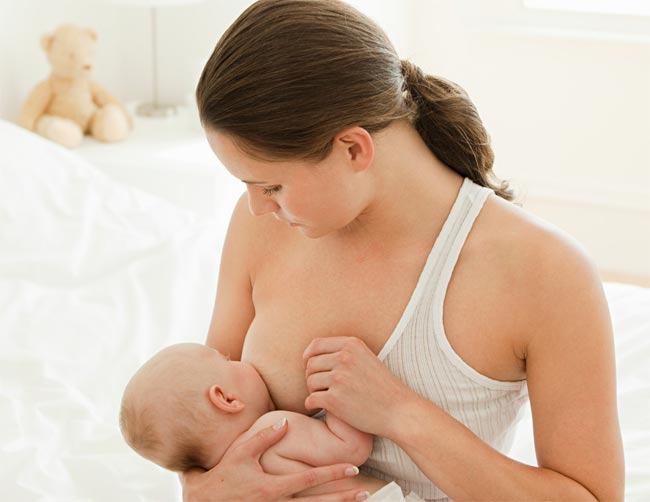
Vegetable soups and stews, dairy-free porridges, fermented milk products and crackers - this is a small list of what you can eat when you are upset. Directly for diarrhea, you should include rice, homemade jelly and pomegranate in your diet. In addition, it is important to drink plenty of water to avoid dehydration.
Breastfeeding during diarrhea is a natural way to protect your baby from possible infection. And for the mother herself, positive emotions from communicating with the baby will help her recover faster from illness.
Folk remedies
Simple traditional medicine recipes will help you get rid of indigestion:
- 2 tsp. Pour ½ liter of boiling water over washed white rice and cook for at least 40 minutes over very low heat. Cool the broth, strain through a fine sieve, drink 50 ml every 3 hours.
- It is useful to drink dill water, as well as mint and lemon balm teas.
- Grind the peels of 1 pomegranate, pour 250 ml of boiling water. Infuse until the liquid turns color, then drink the decoction at a time.
- 1 tsp. oak bark, pour 300 ml of boiling water, simmer over low heat for no longer than 10 minutes. Cool the broth, strain, take 1 tbsp three times a day. l.

You can take advantage of the gifts of nature the first day after the onset of illness. If diarrhea continues for more than 3 days and the temperature does not subside, it is better to entrust your health to a therapist.
Prevention
To prevent the occurrence of diarrhea, it is enough to follow the recommendations:
- Observe proper storage of food, especially in the warm season.
- Do not buy food at “spontaneous” markets, even if you “always bought from this sweet grandmother.”
- It is better to throw away spoiled food without endangering your health - food poisoning can unsettle you for a long time.
- Wash your hands thoroughly when preparing food, before eating, after visiting the toilet, and upon returning from outside.
- Do not drink water from questionable sources.
- Avoid strong emotional experiences and stressful situations.
- Eat a balanced diet.
Diarrhea may indicate more than just a temporary digestive disorder. Often it is a signal of a serious illness, so dangerous symptoms cannot be ignored. During the period of illness, it is advisable for a woman to lower her demands on herself and not put all the worries about the baby on her own shoulders. You can ask close relatives for help, while maintaining strength for recovery.
Possible reasons
Diarrhea during breastfeeding in a woman can occur as a result of many factors.
Possible reasons for the development of such an unpleasant phenomenon may be the following:
- intestinal dysbiosis;
- food poisoning;
- helminthic infestations;
- irritable bowel syndrome;
- poor nutrition;
- allergy;
- failure to comply with hygiene rules;
- diseases of the digestive system;
- infectious diseases.
Sometimes such a pathological process begins even after a stressful situation (neurogenic diarrhea).
Diarrhea caused by an intestinal infection is considered severe. Pathogenic microorganisms cause diseases such as rotavirus infection, dysentery, cholera, and salmonellosis.
